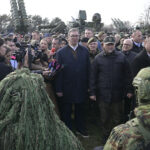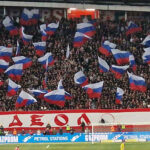- Republika Srpska President Milorad Dodik meets with Belarus leader Aleksandr Lukashenko.
Dodik and Lukashenko met within the framework of the two-day official visit of the RS delegation to Belarus. The purpose of the trip was to establish better cooperation in various areas, including science and education, health care, industry, and agriculture.
Welcoming Dodik at the Palace of Independence in Minsk, Lukashenko emphasized: “You should know the main thing: if something suits you in terms of technology, other issues, including agriculture, industry, or health care, we are always happy to provide you with help and support.”
The Belarus leader said he was closely monitoring the developments in the Balkans. “You know the relations we are building with Bosnia and Herzegovina. We know that it is not easy for you there at times. But you fight courageously. We welcome this. Unfortunately, today only courage, stability, and strength can determine the future of a country, region, district, or territory. I think that you are firmly standing there, representing the interests of Orthodox people. People who trust and believe in you. We are on your side in this regard, and you can count on us,” he said.
RS media emphasize that contacts between Banja Luka and Minsk were facilitated by the position of the Republika Srpska, which opposes the introduction of sanctions by Bosnia and Herzegovina against Belarus. “Western nations treated Belarus unfairly and subjected it to sanctions. Republika Srpska, which is a part of BiH, did not allow BiH to officially impose sanctions on Belarus,” Dodik noted in this regard.
The foreign policy contacts of the RS president should demonstrate the RS solidarity with the Minsk and serve as a kind of challenge to the sanctions policy pursued by the West in relation to the Belarusian leadership and the leaders of the Bosnian Serbs.
After the meeting with Aleksandr Lukashenko, Milorad Dodik is set to meet with Vladimir Putin “in two to three days”, which further asserts Dodik’s anti-Western course.
- Presidential and parliamentary officially announced in North Macedonia
The Chairman of the Parliament of North Macedonia, Jovan Mitreski, announced the presidential and parliamentary elections.
The first round of presidential elections is scheduled for April 24. The run-off will be held simultaneously with the parliamentary election – on May 8.
The presidential campaign will kick off on April 4, the parliamentary one – on April 18.
The election process will be organized by the interim government, formed 100 days prior to the elections and headed by ex-parliament speaker Talat Xaferi.
The latest sociological studies favor the opposition forces, predicting their success. The reason is public discontent with the course of the country’s development.
In mid-February, the results of the electoral survey in two districts were made public. To the question “In which direction do you think Macedonia is moving?” more than 60% of respondents responded “wrong”.
- US Secretary of State Antony Blinken visits Albania
The head of American diplomacy held talks with Albanian Prime Minister, Edi Rama and President Bajram Begaj, as well as took part in the youth forum.
Within the framework of the visit, two memorandums were signed: on mutual understanding on combating disinformation and expanding the Fulbright Program for Albanians.
The visit was timed to the end of Albania’s mission to the Security Council as a temporary member and took place shortly before the Ukraine-SEE summit was scheduled to take place in Tirana.
Noting the “extraordinary partnership” between the countries, Blinken praised Albania’s position on protecting Ukrainian sovereignty and its role as the head of the UN Security Council in 2023, calling Tirana a key partner for stability in the Western Balkans and a firm ally in supporting Ukraine’s sovereignty and territorial integrity.
Experts clearly assessed the visit as a demonstration that the USA considers Albania a key partner in the Western Balkans and an important element of supporting Ukraine in repelling Russian aggression.
- Normalization between Kosovo, Serbia key to peace in Western Balkans, Borrell believes
Sustainable stability and peace in the (Western Balkans) region can only be achieved through the normalization of relations between Kosovo and Serbia. The path to this is through EU-facilitated dialogue.
The High Representative of the European Union for Foreign Policy and Security, Josep Borrell, made the relevant statement on X following separate meetings with the President of Serbia, Aleksandar Vučić, and the Prime Minister of Kosovo, Albin Kurti, within the framework of the Munich Security Conference.
The EU representative for the dialogue between Belgrade and Prishtina, Miroslav Lajcak, also participated in the meetings.
No joint final statements were issued. The meetings can be assessed as informative, aimed at exchanging views on the current situation and planning further steps within the dialogue under the EU auspices.
- Montenegro ready to deepen defense cooperation with Serbia
Beisdes cooperation within NATO and the path toward the European Union, the third priority for Montenegro is regional cooperation, in particular developing relations with Serbia as a friendly nation.
This was stated by the Minister of Defense, Dragan Krapović, who spoke in an interview with the Serbian TV channel, RTS, after the meeting of NATO defense ministers in Brussels.
“Serbia is not a member of NATO, it has its own neutral path. We respect these decisions and in return we expect that the decisions of Montenegro will also be respected. And for my part, I am absolutely ready to deepen cooperation in several areas. This is, first of all, military medicine, CBRN defense, and some other areas,” the head of the Montenegrin defense ministry noted.
Dragan Krapović is Deputy Chairman of the Democratic Montenegro party (“Democrats”). The force is considered to be pro-European and moderately pro-Serbian at the same time.
The statement by the Democrat can be seen as an attempt to establish point cooperation with Serbia on military issues in such a way that it does not jeopardize Montenegro’s Euro-Atlantic choice.
- Serbia acquires more weapons from Russia
On the occasion of the celebration of Serbia’s Statehood Day (February 15), President and Supreme Commander-in-Chief Aleksandar Vučić, together with the country’s military leadership, visited the exposition of Serbian Armed Forces’ weapons and military equipment, held in the fortress of the city of Nis. At the exhibit, the Repellent anti-drone e-warfare system was for the first time shown to the local public. It was just recently purchased from Russia.
Repellent is capable of detecting miniature aerial targets (mosquito UAVs) at a distance of over 35 km and jamming them at a distance of <2.5 km.
Serbia received a ground-based electronic warfare system from Russia a few months ago. According to military experts, the EW system was delivered via air through the airspace of the nations that have imposed sanctions on Russia.



